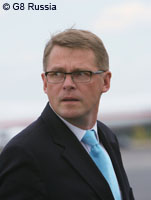Finland's road to further innovation
The Finnish government has outlined a new national strategy for keeping its innovation agenda fresh; despite having the world's most competitive economy, many in Finland worry that its highly successful research and innovation agenda is not as competitive as it should be. The new report, entitled simply 'Science, Technology, Innovation', outlines a national strategy, coordinated by Finland's Science and Technology Council and chaired by the Finnish Prime Minister, Matti Vanhanen. The report lists specific areas in which the strategy should make an impact, specific markets to focus on, areas that should receive more funding, and even increased targets for research and development (R&D) investment. A Finnish government statement outlines the programme, which will see, 'a goal of increasing R&D intensity (research investments as a proportion of GDP) from the current 3.5 per cent to 4.0 per cent by the end of the decade.' Across the EU, the average spend on research and development was as little as 1.9 per cent of GDP in 2004. Recent research has shown that increasing investment in R&D will have a drastic impact on economic growth, making it rise by as much as 10 per cent. The reasons for going back and re-formulating a strategy are 'increasing employment, high productivity and international competitiveness. In this context, research, development of technology, exploiting their results and strengthening social and technological innovation activities play a crucial role,' reads the release. The strategy aims to make an impact in five key areas: - Promote the innovation system and its ability to renew itself; - Enhance competence base; - Improve quality and focus of research; - Promote introduction and commercialisation of research results; - Secure economic 'prerequisites', including human resources. The report identifies five key areas for research, beginning with Strategic Centres of Excellence in STI (science, technology, innovation) in: energy and the environment; metal products and mechanical engineering; forest clusters; health and well-being; and information and communication industry and services. The Finnish Ministry of Trade and Industry and the Ministry of Education will appoint a committee to steer and evaluate measures to develop these areas. To ensure these areas are exploited effectively, the report proposes continuously developing and improving the structures of research, including a dedicated researcher career system, which will mean increasing the number of research posts. The government also notes that 'Novel financing procedures and resources are needed to develop national infrastructures - research equipment and stations, collections, databases, etc.' To do this, a public-private committee will assess long-term needs and give expert opinion on new infrastructure projects. The Finnish proposals include a programme for increasing public research funding, with particular targets for: - Strategic Centres of Excellence; - The development of researcher careers; - Basic funding for universities; - Infrastructures; - Research and education in technology; - Competitive science and technology (S&T) funding. The plan also targets fragmented funding streams, with the aim of bringing them together to back large-scale research projects, whether the money is from national or international sources.
Countries
Finland



